
Vishu Kani, the Malayalam New Year, will be celebrated with great enthusiasm and devotion on Monday, April 14th . This vibrant festival is observed with immense fervor by the Hindu Malayalis, Tuluvas, and Keralites, not only in the state of Kerala but also in parts of Tamil Nadu, Karnataka, the Mahe district of the Union Territory of Pondicherry, and among the Indian diaspora communities across the world. Vishu is primarily a harvest festival, marking the end of the harvest season and the beginning of a new cycle. It is a time of joy, renewal, and gratitude for the bountiful harvest, where every household in Kerala prepares for the occasion with traditional customs and rituals. For the Hindu Malayalis, Vishu is also the New Year, and the day holds special significance as a time to honor Bhagwan Vishnu and his incarnation Shri Krishna.
According to ancient beliefs, Bhagwan Vishnu governs the transition between the old year and the new. On the auspicious day of Vishu Kani, which marks the first day of the astronomical year, devotees offer prayers to Bhagwan Vishnu, seeking his blessings for prosperity, happiness, and a year filled with divine protection.
Festival Date, Time & Muhurat
Vishu Kani Festival will be observed on Wednesday, April 15, 2026.
First day of the Malayalam month Medam as per the Malayalam calendar.
Key Timings for Vishu Kani Festival 2026:
Vishu Kani on Wednesday, April 15, 2026
Sankranti Moment on Vishu Kani - 12:09 PM, Apr 14
Note: Sunrise and sunset vary by region and date due to India's geographical diversity. For exact timings, refer to local astronomical data.
Significance & Importance of Vishu Kani

The Vishu Kani festival, which marks the first day of the Meddam month in the Malayalam calendar, falls around mid-April each year. According to the Gregorian calendar, it corresponds to the months of April and May, aligning with the arrival of spring. The term 'Vishu' is derived from the Sanskrit word that means 'equal,' symbolizing balance and harmony. This theme of equality is especially significant, as Vishu represents the spring equinox, when the day and night are of equal duration. This natural equilibrium is seen as a reflection of the balance between light and darkness, prosperity and adversity, and life’s cyclical nature.
As a festival deeply connected to the natural world, Vishu marks the beginning of the harvest season, particularly in Kerala, where it is celebrated as the Malayalam New Year. It is a day when families come together to celebrate the bountiful harvest and offer gratitude for the abundance bestowed upon them. Devotees believe that observing Vishu with devotion, especially the Vishu Kani ritual, brings prosperity, good fortune, and peace in the coming year. The ritual involves setting up a special display of holy items, including fruits, flowers, coins, coconut, rice, gold, and a lamp (nilavilakku), placed before an image or idol of Bhagwan Vishnu. The belief is that the first thing seen on Vishu morning, the Vishu Kani, will determine the fortune for the rest of the year. It is thought that seeing these auspicious symbols of prosperity and goodness fills the mind with positive thoughts and ensures a good start to the year.
Vishu is not only a festival of personal renewal but also a cultural celebration that highlights the importance of family, unity, and gratitude. It marks a fresh beginning, where people pray for prosperity, success, health, and happiness. It also emphasizes the need for harmony between human beings and nature, as the festival is rooted in the seasonal changes that affect the harvest and livelihood of communities. The festival’s significance is also reflected in the broader Indian context, as it shares its timing with other regional festivals such as Ugadi in Andhra Pradesh and Karnataka, Bihu in Assam, and Baisakhi in Punjab. Each of these festivals celebrates the new harvest, new year, and renewed vitality, emphasizing the diverse ways in which different regions mark the arrival of spring and honor the blessings of nature.
The Vishu festival is an embodiment of hope, renewal, and divine blessings, reinforcing the timeless connection between humanity and the cycles of nature. Through prayers, rituals, and family gatherings, it is a day to reaffirm one’s faith in positive energy and the promise of a prosperous year. The festival’s observance serves as a reminder that balance, gratitude, and devotion are key to navigating life’s challenges, ensuring that each year is filled with abundance and good fortune.
History of Vishu Kani Festival
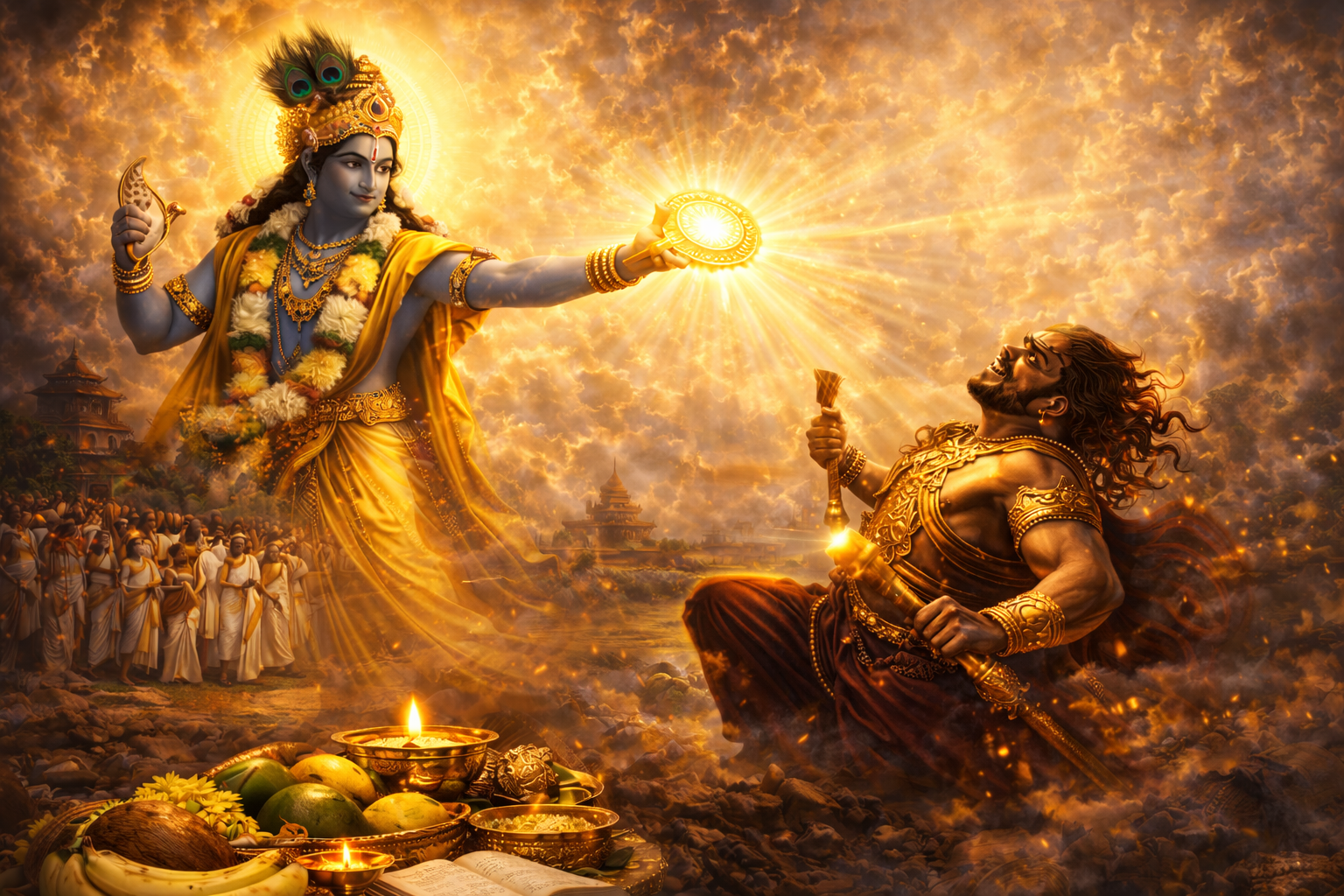
Bhaskara Ravivarman, a devoted follower of Bhagwan Vishnu and a revered ruler who reigned over Kerala between AD 962 and 1021, referenced the festival of Vishu in his work, ‘Trikodithanam Shasanam’, calling it ‘Chithira Vishu’. The celebration of Vishu, however, is believed to have gained widespread prominence and fervor during the reign of Sthanu Ravi, a ruler of Kerala between 844 and 855 AD, who played a crucial role in establishing it as a major festival in the region. Historical scriptures and accounts suggest that Vishu became a day of deep religious significance, particularly among the Malayali community, who celebrated it with immense zeal and devotion to honor Bhagwan Vishnu.
According to many ancient scriptures, Vishu marks the day when Bhagwan Krishna, the incarnation of Bhagwan Vishnu, vanquished the demon Narkasura, bringing peace and prosperity to the world. This victory is seen as a triumph of good over evil, symbolizing the promise of new beginnings and the triumph of light over darkness. Another intriguing legend connected to Vishu is the story from Hindu mythology, which narrates how Ravana, the powerful king of Lanka, once prevented the Surya Devata (Sun God) from rising in the East, casting darkness upon the world. It is said that on the day of Vishu, when Bhagwan Rama, the seventh incarnation of Vishnu, defeated Ravana, the Sun began to rise again from the East, symbolizing the return of light and justice to the world.
The celebrations of Vishu have been observed with immense devotion for over 1,178 years, and the festival continues to be celebrated by the Malayali community with great enthusiasm and traditional rituals. From the sacred Vishu Kani to the joyous gatherings of families, the festival has transcended regional boundaries and is now celebrated by Malayali diaspora communities across the globe. The festival’s timeless charm, coupled with its rich religious and cultural significance, continues to inspire devotion, unity, and spiritual renewal among people worldwide, ensuring that the traditions of Vishu are passed down through generations in their most sacred form.
Vishu Meaning & Traditional Rituals
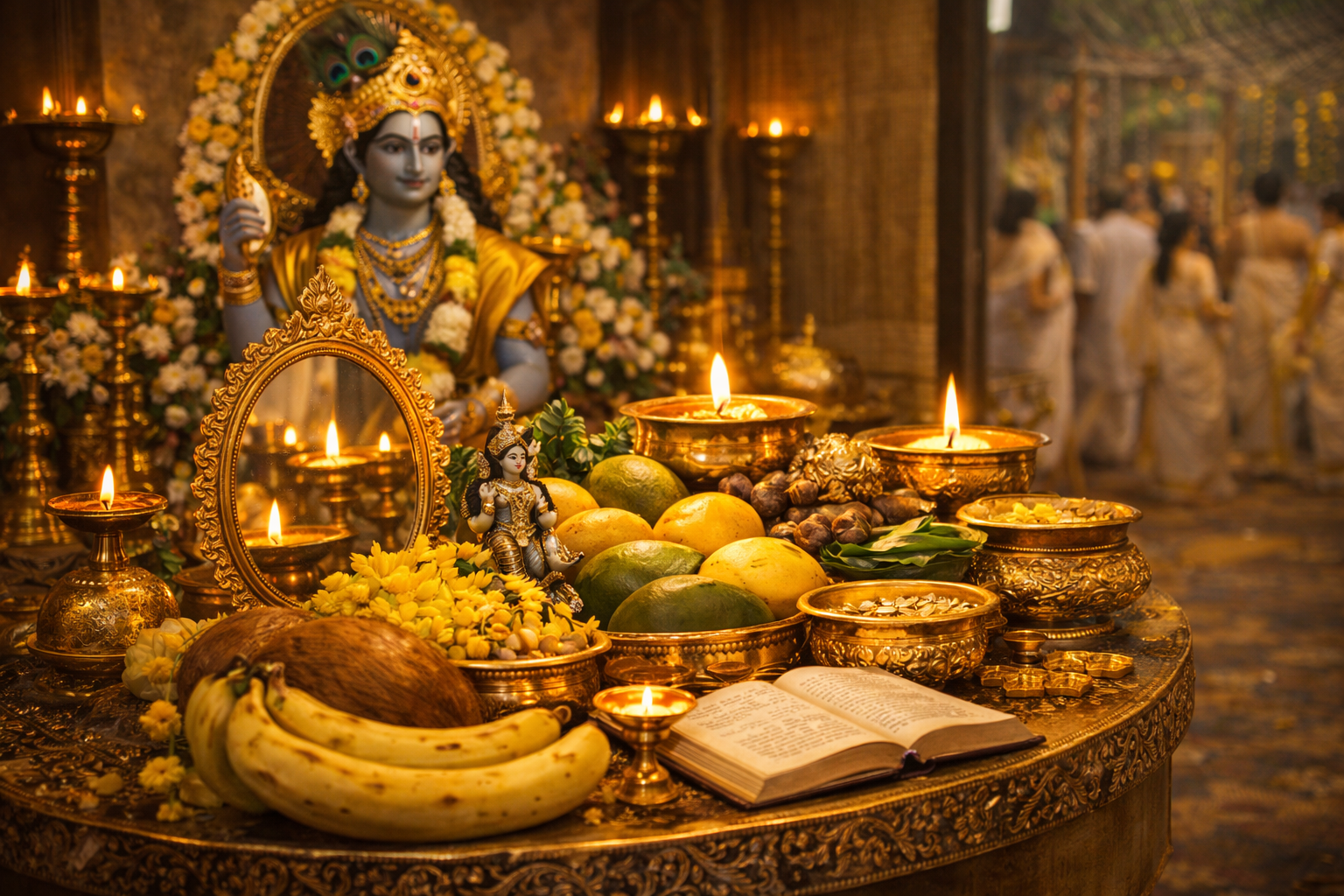
Vishu Kani, also known as Vishukkani, is a cherished and age-old ritual practiced by Malayali people at the dawn of Vishu. This ritual involves viewing auspicious items first thing after waking up on Vishu morning. It is believed that what a person sees upon waking will determine their prosperity and finances for the year ahead. The night before Vishu, families prepare by arranging these auspicious objects in a bell-shaped Urli and lighting a Nilavilakku (traditional lamp), symbolizing the presence of divine light and blessings.
The word 'Kani' in Malayalam means 'that which is viewed first,' making Vishu Kani an act of opening one's eyes to a set of carefully arranged auspicious objects, such as Kani Konna flowers, betel leaves, coconuts, raw rice, coins, lemons, Areca nuts, jackfruit, a metal mirror, and a holy book. These items are arranged by the eldest woman in the family in front of an idol or image of Bhagwan Vishnu or Bhagwan Krishna. On Vishu morning, family members wake up but keep their eyes closed as part of a traditional belief. They then walk toward the Vishu Kani, opening their eyes only when they reach it, symbolizing the welcoming of prosperity and divine blessings for the new year.
The ritual is not just limited to homes but is also performed in temples, where devotees visit to participate in the ceremony. After the Vishu Kani, the family gathers to recite verses from the Ramayana, marking an important spiritual moment. This ritual, filled with hope and reverence, symbolizes a fresh start and the belief that divine grace will bring happiness and prosperity in the year ahead.
According to Vedic Astrology, on the day of Vishu, the planet Sun transits to the zodiac sign of Aries which is also known as the Mesha Rashi. On this day, the farmers plough their fields and also carry out various agricultural activities.
Stories of Vishu Kani Festival
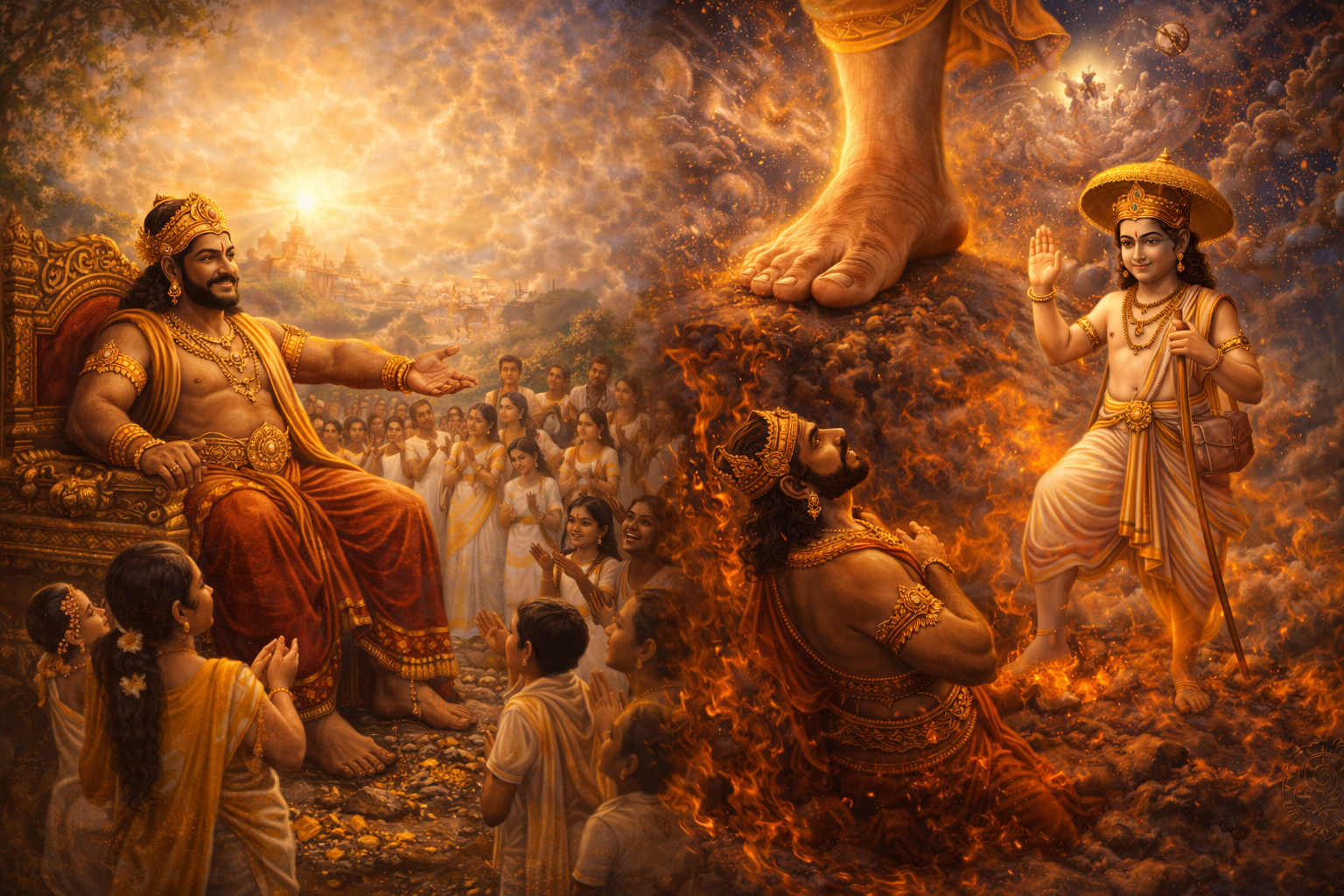
One of the most widely told stories behind the Vishu Kani festival is associated with Bhagwan Vishnu, who is considered the God of Preservation in Hindu mythology. According to this story, the Vishu Kani ritual began as a way of invoking the divine blessings of Bhagwan Vishnu for a prosperous and prosperous year ahead. On the day of Vishu, devotees believe that Bhagwan Vishnu visits the Earth to bless his devotees with good fortune.
It is said that after the long winter, the arrival of Vishu marks the beginning of the spring season, a time for renewal and abundance. In this story, the Vishu Kani (the first sight of the year) is meant to symbolize the auspicious beginning of the year, where devotees prepare the sacred offering of fruits, flowers, rice, gold, and a lamp. The belief is that whatever one sees first on Vishu morning will set the tone for the entire year. Bhagwan Vishnu’s presence in the Vishu Kani ensures prosperity, and it is thought that those who perform this ritual with devotion will be blessed with good health, wealth, and happiness in the coming year. The essence of this story is that the spiritual significance of the day transcends the rituals, as it embodies hope and divine intervention for a prosperous year.
Another significant mythological story associated with Vishu is the tale of King Mahabali, a legendary Asura king who ruled Kerala in ancient times. King Mahabali was known for his immense generosity, and during his reign, the people of his kingdom were blessed with happiness, prosperity, and peace. However, due to his growing power, the gods became jealous, and they decided to send Bhagwan Vishnu to defeat him.
Bhagwan Vishnu, in his Vamana (dwarf) incarnation, approached King Mahabali disguised as a Brahmin and asked for three paces of land. King Mahabali, known for his fairness, agreed to the request. In a miraculous display of divine power, Bhagwan Vishnu took his three strides, covering the entire universe in one step and banishing King Mahabali to the netherworld. Despite this, King Mahabali's devotion to his people was so strong that he was granted permission by Bhagwan Vishnu to visit his kingdom once a year.
It is believed that on the day of Vishu, King Mahabali returns to visit his people, bringing prosperity and blessings for the upcoming year. This story symbolizes the victory of virtue and devotion over arrogance, as well as the idea of a ruler's selflessness and love for his people. The Vishu Kani ritual is said to honor the memory of King Mahabali’s visit, as people believe that on this day, his spirit returns to bless them with abundance and happiness. The festival, therefore, also serves as a reminder of the importance of humility, compassion, and fairness in leadership and life.
How to celebrate Vishu Kani Festival
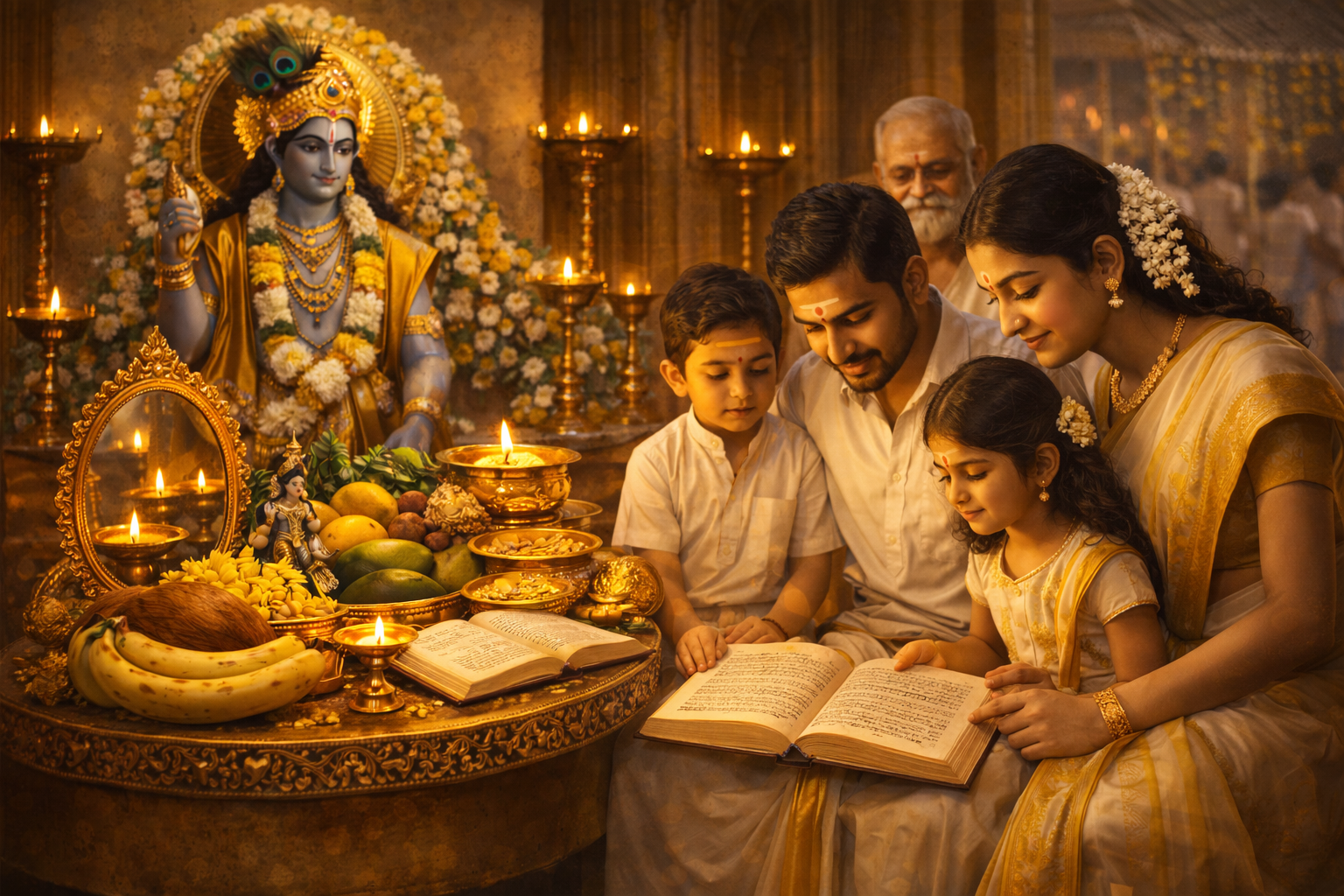
The Vishu Kani festival is a highly auspicious time for worshipping Bhagwan Vishnu and Bhagwan Krishna, and it brings families together in joyous celebration. The festival is rich with various customs and rituals that have been passed down through generations, each of which plays a significant role in marking the occasion.
Among the key aspects of the celebration are the Vishu Kani, Vishu Phalam, Vishu Kaineettam, Vishu Sadya, Vishu Padakkam, and the exchange of Vishu greetings. Let’s explore each of these rituals in detail.
Reading the Ramayana is an important part of the Vishu celebrations. After seeing the Vishu Kani, it is customary for people to recite verses from the Ramayana, which is regarded as a sacred text in Hinduism. The first page of the Ramayana opened by the devotee is believed to have a significant influence on their life and fortune in the coming year. This practice adds a spiritual dimension to the festival, reinforcing the connection between the devotee and divine blessings.
Vishu Phalam
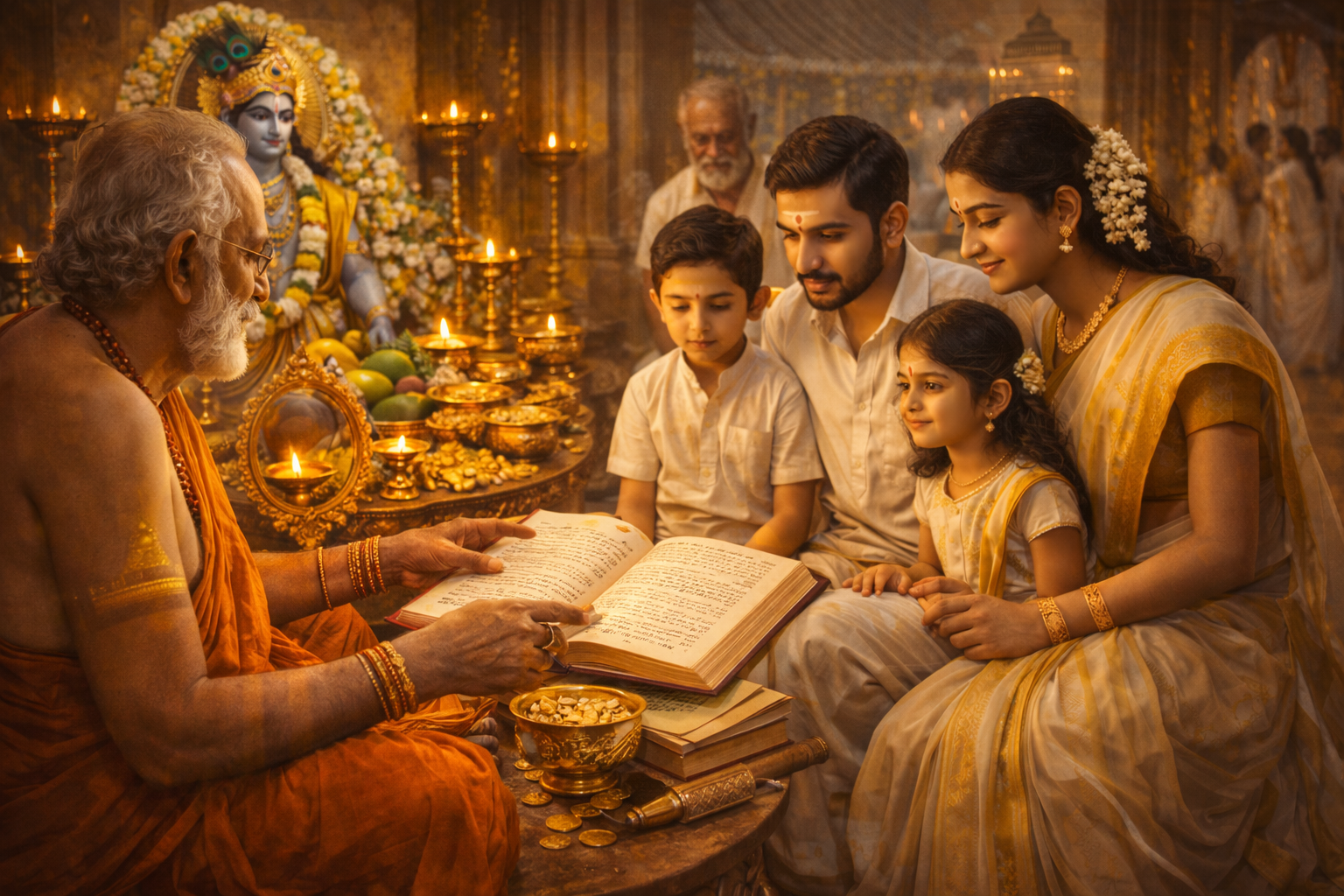
Vishu Phalam, which translates to ‘prediction for the upcoming year’, holds great significance as part of the Vishu festival, particularly in Kerala, Andhra Pradesh, Karnataka, and among the Malayali diaspora communities worldwide. As an astronomical New Year, Vishu is seen as a highly auspicious time to receive guidance for the year ahead. Traditionally, Vishu Phalam involved an expert astrologer from the community visiting homes, or Illams (traditional Kerala houses), to offer personalized predictions for each family member. These readings were believed to provide insight into one's fortunes and life events for the coming year. In contemporary times, however, Vishu Phalam is typically published in popular Jyotish (astrology) magazines or broadcasted via media, making it easily accessible to a wider audience. Regardless of the medium, the tradition of Vishu Phalam continues to be an integral part of the festival, offering a glimpse into the future and reinforcing the cultural and spiritual status of Vishu.
Vishu Kaineettam
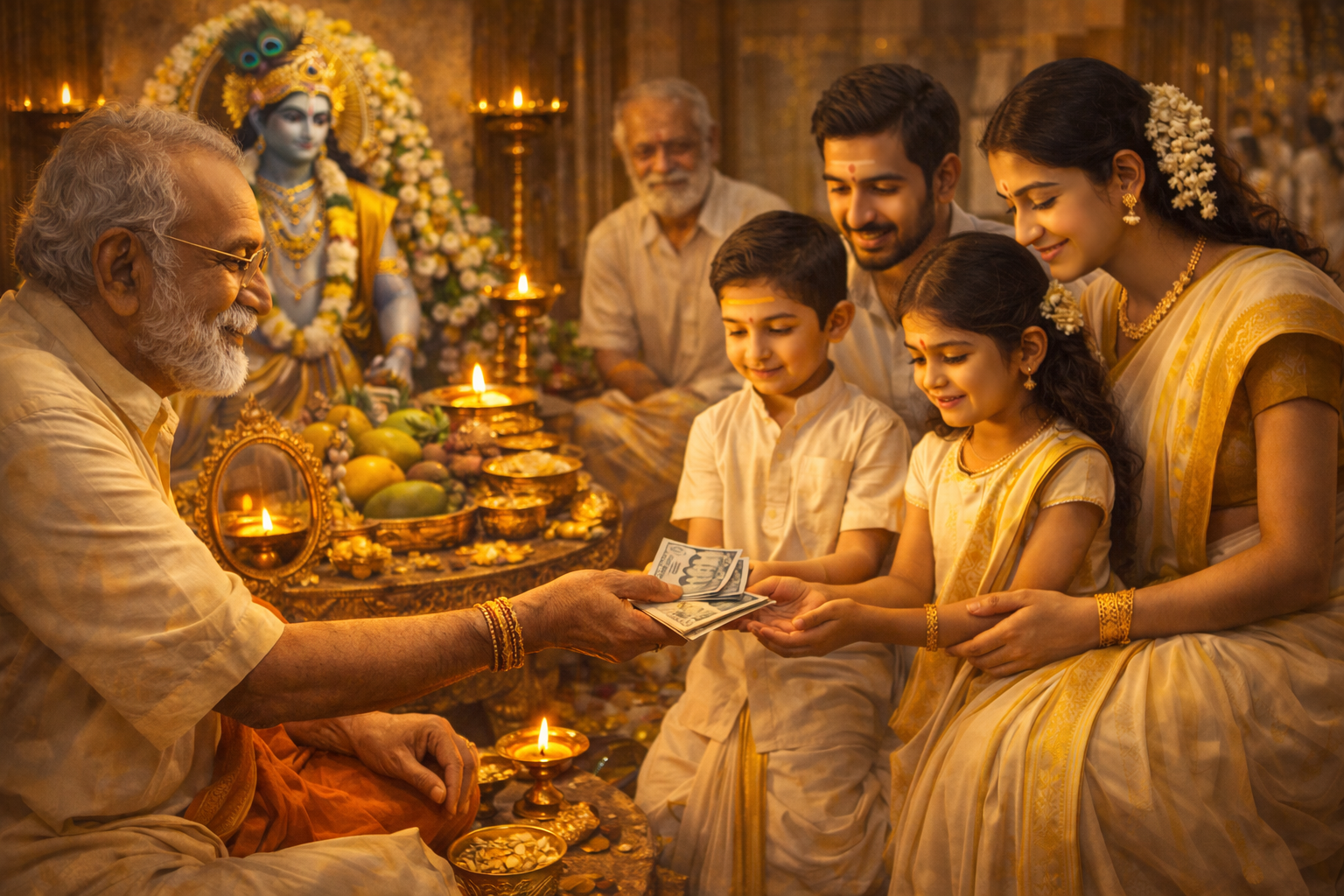
Vishu Kaineettam is a cherished tradition where the elders of the family give gifts to children on Vishu. Historically, this custom involved giving coins to children, but in modern times, currency notes are also given as gifts. This gesture symbolizes the passing of blessings and prosperity from one generation to the next, ensuring that the children start the new year with good fortune.
Vishu Sadya
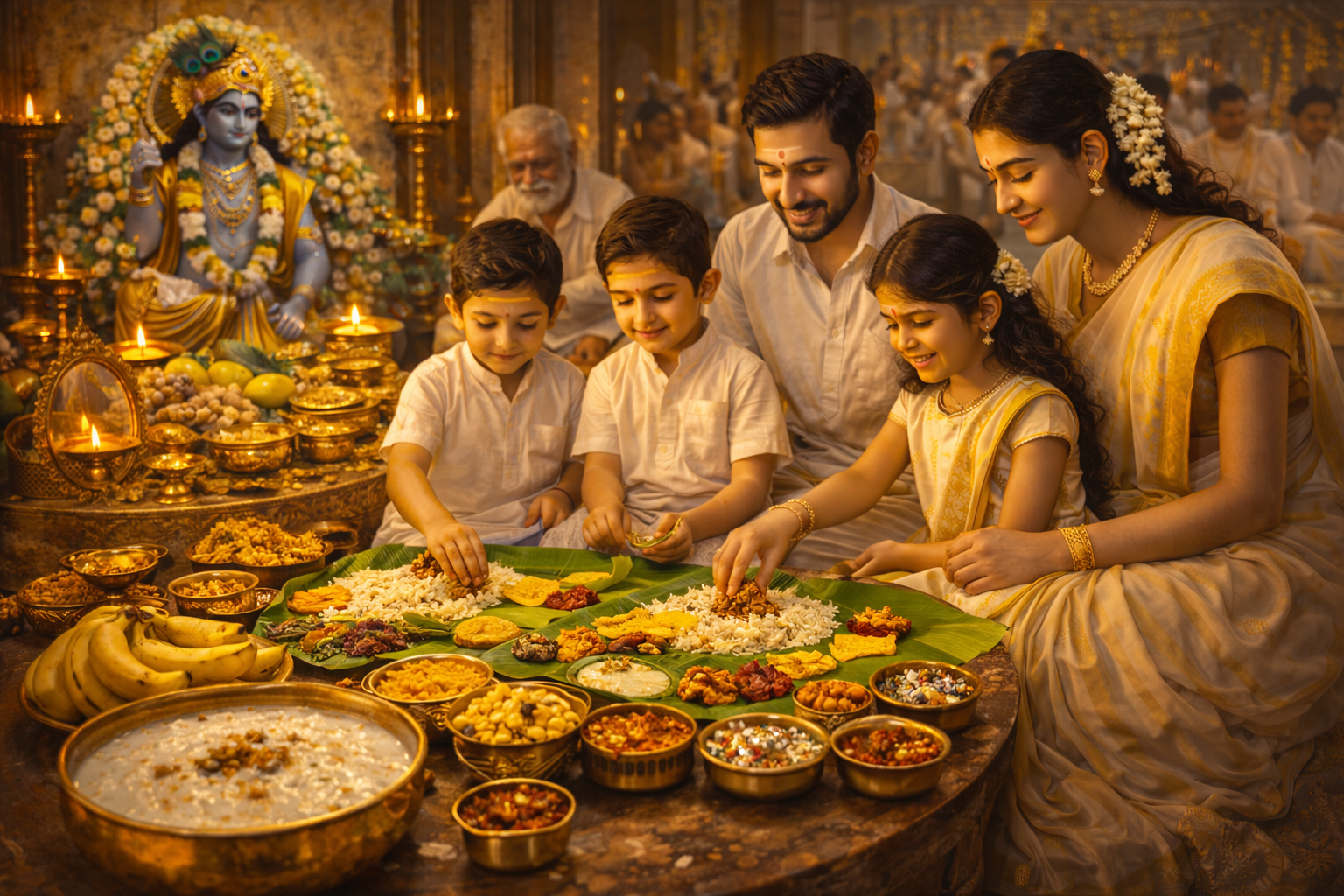
Vishu Sadya is a grand feast prepared on the day of Vishu, starting with a traditional breakfast called Vishu Kanji. This dish is a porridge made by boiling rice in coconut milk and adding a variety of spices. After this, a lavish Vishu Sadya is prepared for lunch, which includes a spread of traditional Malayalam delicacies. The meal is an essential part of the celebration, symbolizing abundance and the joy of family togetherness.
Vishu Padakkam
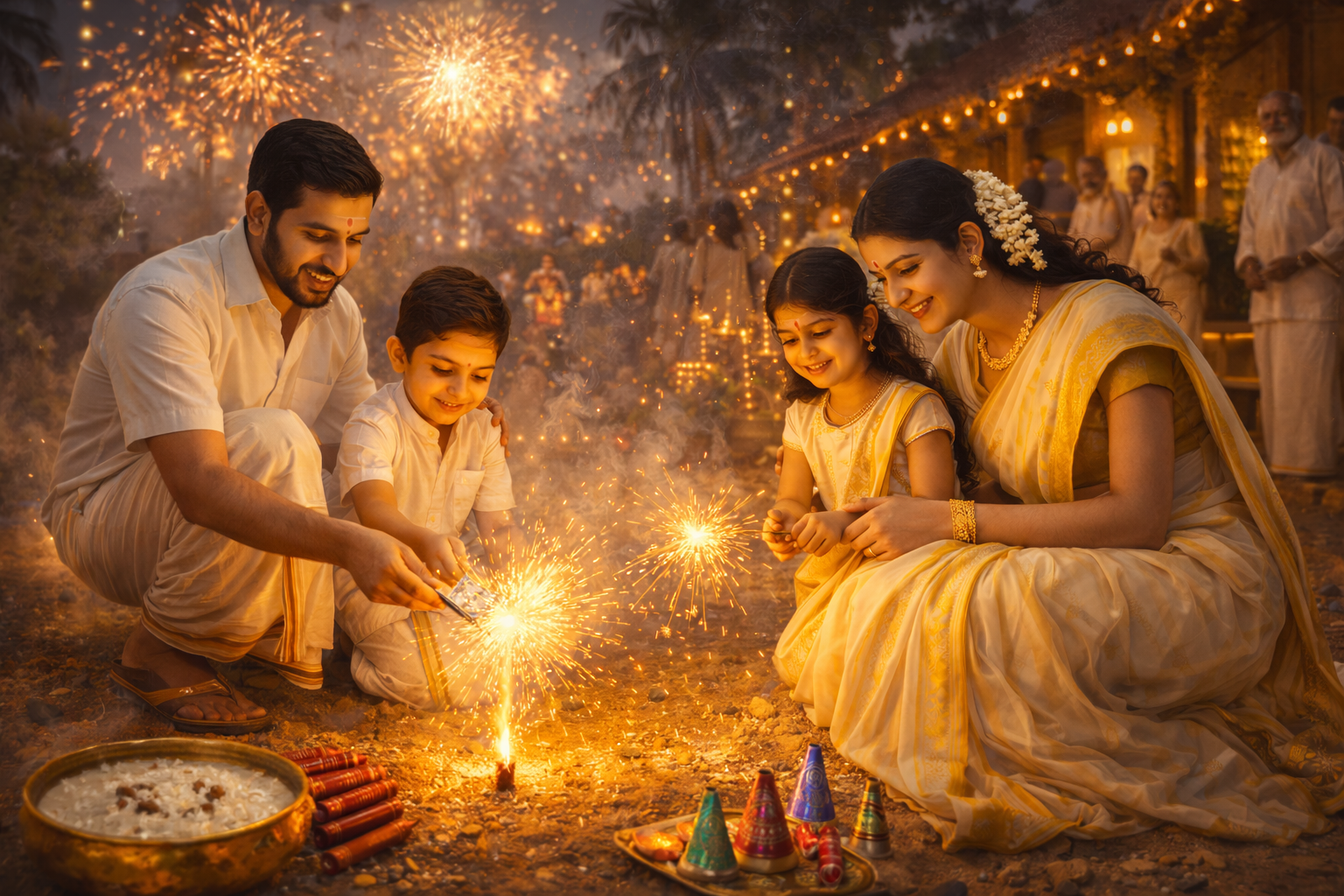
Vishu Padakkam refers to the bursting of firecrackers, a fun and exciting tradition after breakfast on Vishu. Youngsters step out of their homes to light crackers, and even the elders join in the celebration, making it a lively and festive activity enjoyed by all.
Finally, Vishu Greetings are exchanged between friends and family with the words ‘Vishu Ashamsakal’, which translates to 'Greetings on Vishu.' This exchange of wishes signifies the warm-hearted spirit of the festival, spreading joy and goodwill among loved ones.
Thus, Vishu holds immense cultural and spiritual significance, especially in the southern parts of India, and is celebrated with great enthusiasm and reverence. Each ritual is a way of honoring the divine, ensuring prosperity, and bringing happiness into the lives of everyone.
This year, let's celebrate Vishu in the traditional way, spreading joy and positivity to all!
Vishu Kani Festival Puja Vidhi (Puja Procedure)
_201845.png)
On Vishu, the traditional puja (ritual worship) begins early in the morning. The first step is to wake up before sunrise and take a bath, as purification of the body and mind is important for the ritual. After bathing, devotees should wear new clothes, symbolizing a fresh start and renewal for the new year.
The worship begins with the setting up of the Vishu Kani, a sacred arrangement of auspicious items. These include Kani Konna flowers (yellow flowers), coconuts, betel leaves, rice grains, fresh lemons, coins, and a metal mirror. A Nilavilakku (traditional Kerala lamp) is lit next to the Kani and placed in front of the Bhagwan Vishnu or Bhagwan Krishna idol.
Once everything is set up, all family members, with their eyes closed, gather near the Vishu Kani. The belief is that the first thing seen on Vishu morning will bring prosperity for the year. After reaching the setup, they open their eyes to view the Vishu Kani. This act is followed by prayers, where the family members offer gratitude for the blessings of the past year and seek divine grace for the year ahead.
After the Vishu Kani, reciting verses from the Ramayana or other holy texts is customary, especially by the head of the family. This is followed by Vishu Kaineettam , where elders give gifts, usually money or currency notes, to the younger members of the family, wishing them prosperity.
After the ritual, a grand feast called Vishu Sadya is prepared, marking the completion of the puja. The puja concludes with family members greeting each other with 'Vishu Ashamsakal', meaning 'Happy Vishu,' and with wishes for a prosperous year ahead.
Vishu Kani Puja Mantra
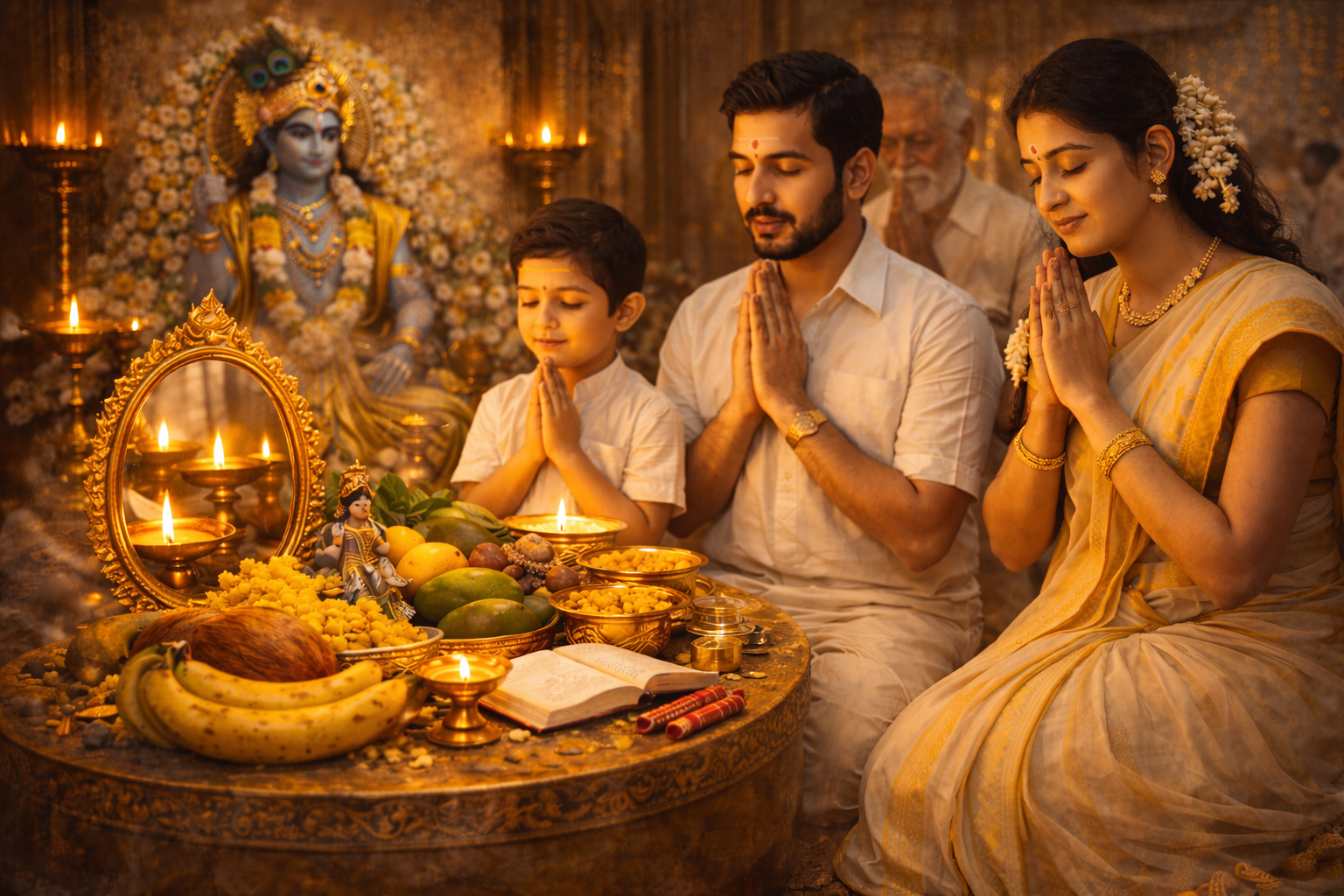
This is the primary mantra that is recited during the Vishu Kani Puja:
ॐ नमो भगवते वासुदेवाय
Om Namo Bhagavate Vasudevaya
This mantra is a salutation to Bhagwan Vishnu, invoking his blessings and grace. It is said to purify the mind and soul, inviting divine protection, prosperity, and spiritual fulfillment in the new year.
Additionally, after the Vishu Kani, devotees may also recite the Vishnu Sahasranama (1000 names of Bhagwan Vishnu) or specific verses from the Ramayana to seek Bhagwan Vishnu's blessings for a prosperous and blessed year ahead.
Vishu Kani Vrat Vidhi (Fasting Procedure)
The Vishu Kani Vrat begins with the observance of fasting on Vishu morning. The first step is to wake up early, before sunrise, and take a bath to purify oneself. This is essential for spiritually preparing for the day ahead.
It is customary to wear new clothes as a symbol of starting the year fresh. Once you are cleansed and dressed, the focus shifts to setting up the Vishu Kani, which includes Kani Konna flowers, rice, coins, lemons, coconut, and a Nilavilakku (traditional lamp). The Vishu Kani is arranged in front of the Bhagwan Vishnu or Bhagwan Krishna idol or image.
As part of the fast, devotees avoid eating until the Vishu Kani ritual is performed, which typically takes place in the morning, just after waking up. After the arrangement is complete, the family gathers, and everyone keeps their eyes closed as they walk toward the Vishu Kani. It is believed that the first thing seen on Vishu will bring prosperity for the year ahead. After opening their eyes and viewing the Vishu Kani, prayers are offered to Bhagwan Vishnu, seeking blessings for the upcoming year.
The fast can be broken after the Vishu Kani ritual, during which a simple meal, often consisting of Vishu Kanji (a porridge made from rice and coconut milk), is consumed. The fasting process symbolizes purification, and by following it with devotion, devotees invite health, prosperity, and good fortune for the coming year. The fast concludes with the customary Vishu Sadya, a grand meal shared with family, celebrating the new year and the blessings received.
Vishu Kani Vrat Katha (Traditional Fasting Story)
_201843.png)
The Vishu Kani Vrat Katha is a story steeped in divine blessings, symbolic rituals, and ancient wisdom, passed down through generations. The origins of the Vishu Kani ritual are closely tied to the spiritual and moral guidance imparted by the venerable Sage Vasishtha. In ancient times, King Raghu, a devout follower of Bhagwan Vishnu, sought a way to ensure the prosperity and peace of his kingdom year after year. It was then that Sage Vasishtha advised him to observe a sacred practice on the first day of the Vishu festival, an offering to Bhagwan Vishnu to invoke his divine blessings for the coming year. The sage instructed the king to arrange an offering of auspicious items, such as Kani Konna flowers, rice, gold coins, coconuts, betel leaves, lemons, and a Nilavilakku (a traditional lamp). These items symbolized wealth, good health, and prosperity, as well as the divine light of wisdom and grace.
King Raghu, deeply moved by the sage’s words, decided to follow the instructions meticulously. On Vishu morning, he rose before dawn and made his way to the sacred altar, where the arrangement of the Vishu Kani was set. As he opened his eyes to behold the radiant sight before him—the golden Kani Konna flowers, the shining coins, the fresh lemons, and the glowing light of the Nilavilakku-he experienced an overwhelming sense of peace, joy, and divine presence. He realized that this simple yet powerful ritual was not just an offering of material wealth, but a spiritual invitation for divine blessings. It was the first sight of the year, and with it, the king felt the promise of prosperity, balance, and happiness in his kingdom for the coming year.
Moved by the profound impact of the ritual, King Raghu declared that the Vishu Kani should become an integral part of every household, a spiritual act that would connect the people to Bhagwan Vishnu’s blessings. He encouraged his people to perform this ritual every Vishu morning, believing that seeing the Vishu Kani would fill their hearts with positive energy, ensuring they began the year with a deep connection to the divine. The king’s decree spread throughout the kingdom, and soon, the practice of arranging the Vishu Kani became a beloved tradition that lasted through the ages.
According to the story, it is believed that the divine presence of Bhagwan Vishnu is invoked as the Vishu Kani is viewed for the first time on Vishu morning. This sight, symbolizing the victory of light over darkness, is seen as a promise of blessings for the year ahead. The ritual serves as a reminder that the world is governed by cosmic balance, and that by honoring divine grace and seeking prosperity with sincerity, one can align with the flow of cosmic energy.
The Vishu Kani Vrat is more than just a physical fast; it is a spiritual cleanse. It is a way to begin the year by purifying the mind and body, inviting prosperity and divine protection. The ritual connects the devotee to the divine order and reminds them of the eternal cycle of life—of creation, preservation, and renewal—offering a fresh start to every year filled with promise, gratitude, and divine favor.
Through the Vishu Kani Vrat, devotees reaffirm their faith in Bhagwan Vishnu’s grace and prepare themselves to embrace the blessings and challenges of the year ahead with courage and hope.
Puja Utensils, Essentials

Rudra Centre brings an extensive collection of Puja Articles which caters to all that is required for daily and special Puja Vidhis. We offer variants of designs and sizes in each category. The list includes handcrafted Puja Mandirs, Puja Pedestals, offering Bowls, Panchpatra, intricately carved Puja Thalis, Abhishek Vessels, in different materials, Pure Silver/German Silver articles like Kalash, set of Shodash Upachara and Several other Puja Articles, which we deliver at your doorstep.
Shaligram Shilas

Collection of sacred, rare and authentic Shaligram Shilas. Shaligrams represent Bhagwan Vishnu and are naturally formed and found only in the Gandaki Kali River in Nepal. Shaligrams with different marking signifying various forms of Bhagwan Hari, worshipping them bestows protection, wealth, good health, pleasure and spiritual progress.
Shri Krishna Puja Mantra Jaap
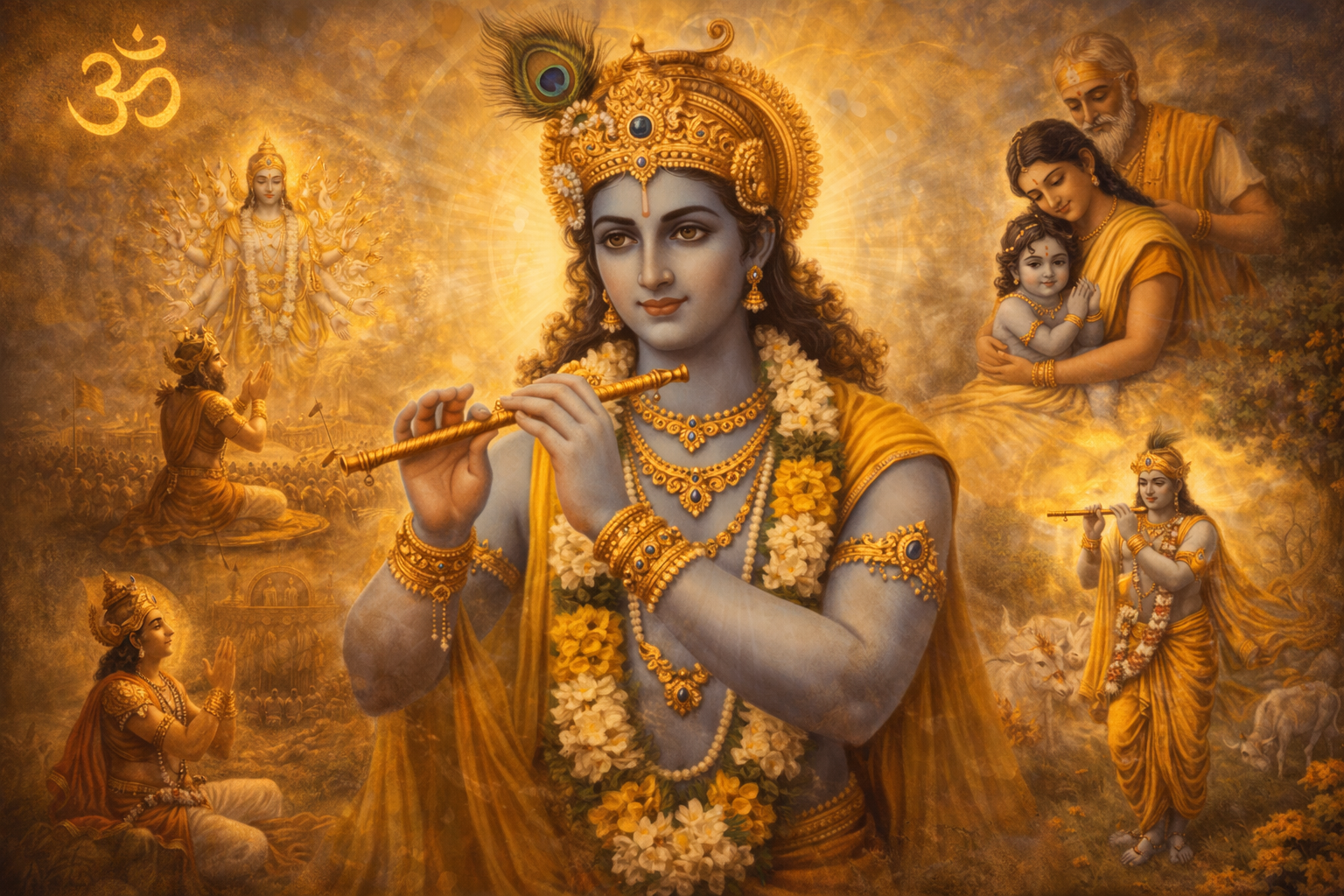
Bhagwan Krishna is a perfect guide, friend, lover, son and child, he taught mankind to walk the path of truth. Bhagwan Krishna was born to Devaki and Vasudeva to provide enlightenment to the mankind. The Omnipotent Bhagwan Krishna is considered as the Supreme Being who revealed his Vishwaroopa to Arjuna during Mahabharata. Bhagwan Krishna provides it’s devotees with protection, knowledge and liberation.
Benefits of Lord Krishna Puja:
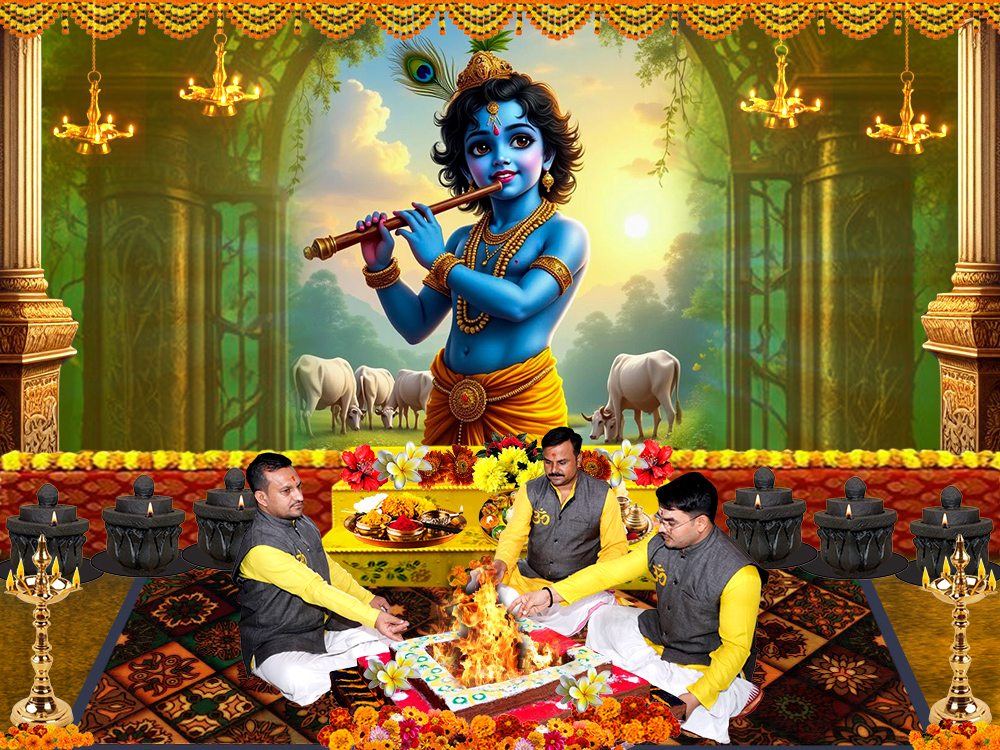
- For success and growth in career, education and business
- For confidence, self-worth, personality and charisma
- For good health and spiritual upliftment
- For empowerment, peace of mind and protection
Rudra Centre brings an extensive collection of Puja Articles which caters to all that is required for daily and special Puja Vidhis. We offer variants of designs and sizes in each category. The list includes handcrafted Puja Mandirs, Puja Pedestals, offering Bowls, Panchpatra, intricately carved Puja Thalis, Abhishek Vessels, in different materials, Pure Silver/German Silver articles like Kalash, set of Shodash Upachara and Several other Puja Articles, which we deliver at your doorstep.
Conclusion
The Vishu Kani festival is not just a celebration of the new year but a profound spiritual practice that invites divine blessings, prosperity, and harmony into the lives of those who observe it. The act of seeing the Vishu Kani—the first sight of auspicious items—on Vishu morning serves as a symbolic doorway to a year filled with hope, joy, and positive energy. Rooted in ancient tradition, this ritual is a reminder of the importance of balance in our lives and the power of starting anew with purity of mind and spirit. It’s a celebration that brings families together, fosters gratitude for the blessings of the past year, and sets the stage for divine favor in the year ahead.
In a world that often moves too quickly, the Vishu Kani ritual invites us to slow down, reflect, and open our hearts to the divine light. As people gather around the Vishu Kani, whether in homes or temples, they not only look forward to a prosperous year but also reaffirm their deep connection with the divine forces that govern the universe. This age-old tradition, filled with meaningful symbolism and joy, continues to inspire millions, reminding us that each new year is an opportunity for growth, renewal, and an abundance of blessings. Let’s celebrate Vishu Kani with reverence, spreading happiness and good wishes to all, and welcome a year filled with divine grace and endless possibilities.

_201842.png)

-in-Astrology.jpg)
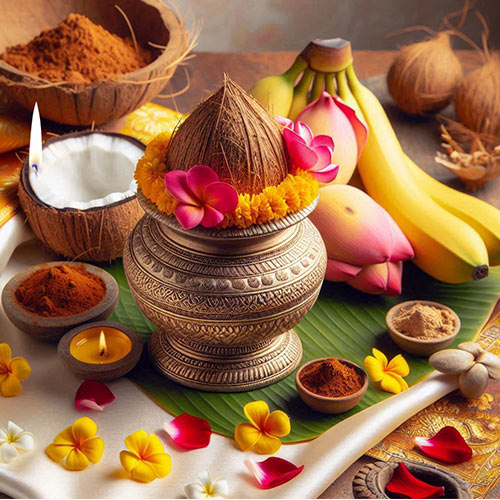
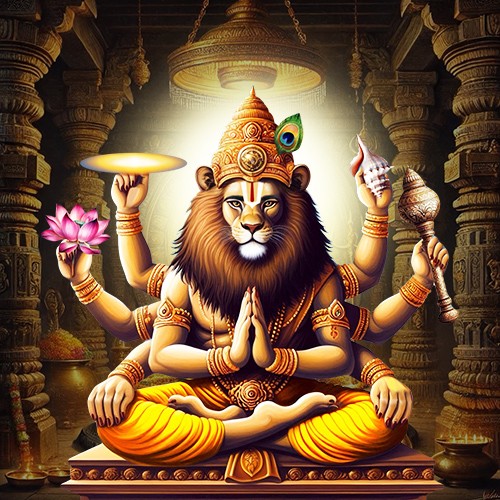
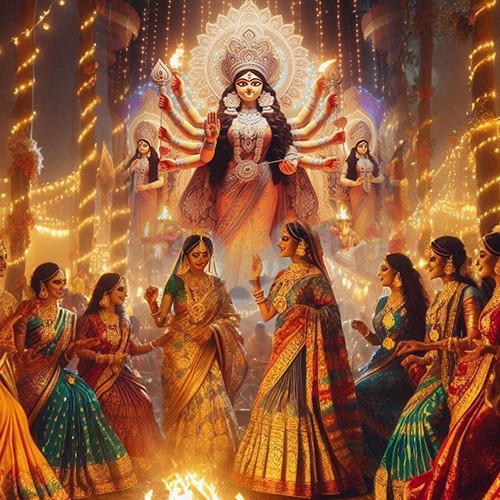
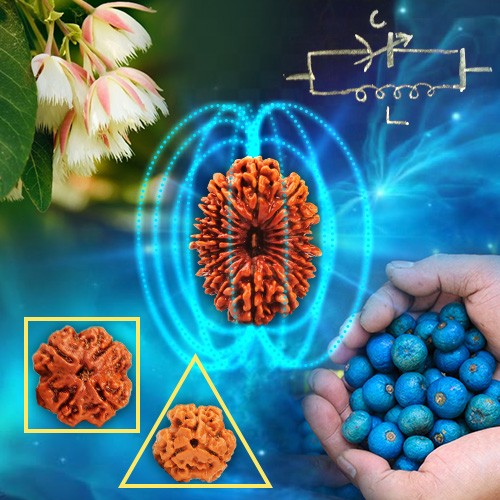

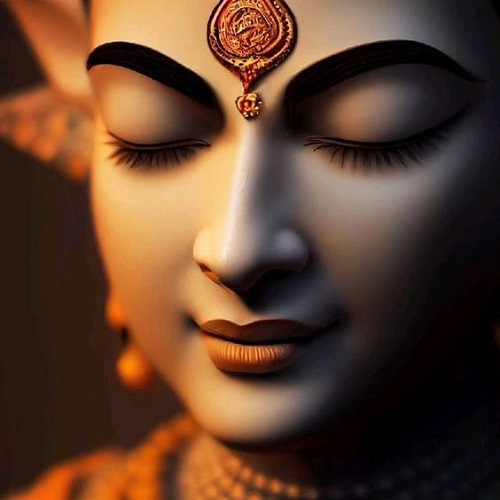
.jpg)
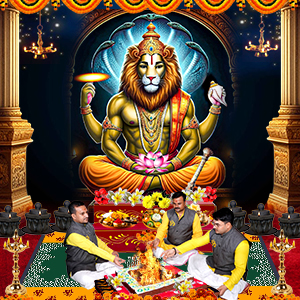
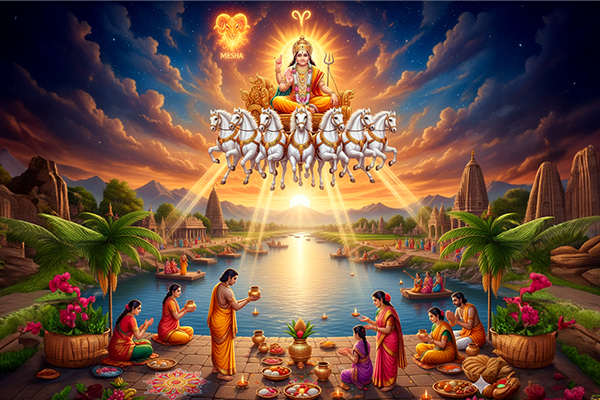

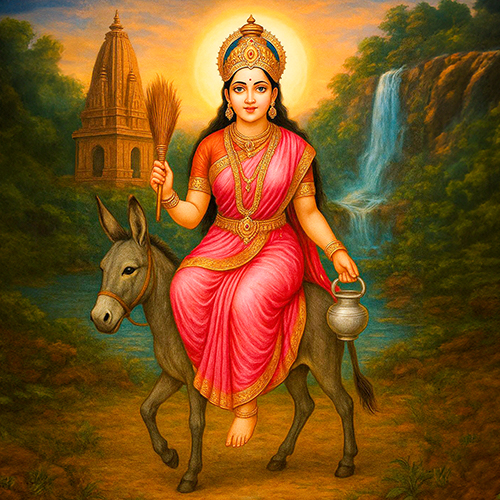
Comments 0
Leave your thought here